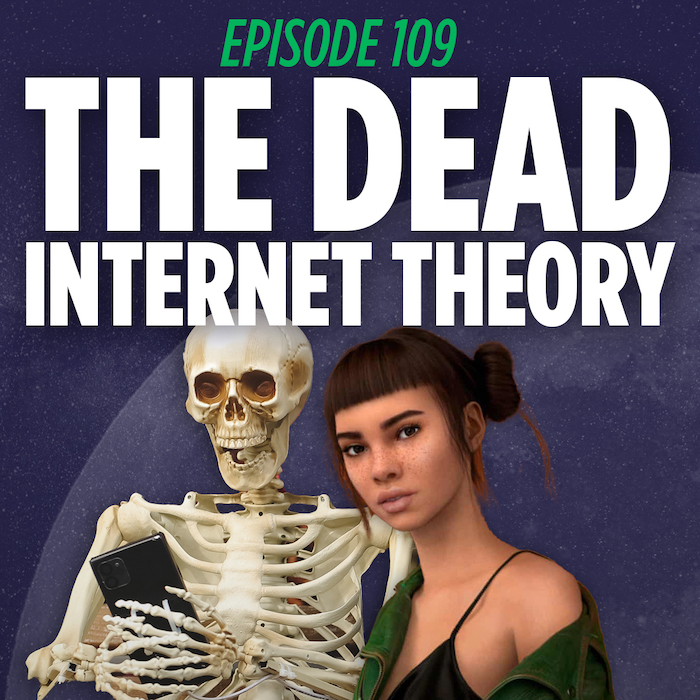In the mid-’90s, the internet took the world by storm. For the first time in history, everyone had access to an unprecedented amount of information. In those early years, the entire web was curated by skilled webmasters who understood the inner workings of the internet. Over time, new technologies allowed everyone to share their thoughts and ideas with the world.
Recently, bots were let loose online to fulfill a variety of tasks. Most of these robots perform necessary and helpful tasks. Unfortunately, however, some were deployed for malicious purposes. Major sites across the web have documented the rapid increase in bot traffic on their platform over the past few years. The increased A.i. traffic has led some people to theorize that the internet is dead and the bots have taken over. The theory that we’ve lost control of the world wide web is known as Dead Internet Theory, and this is its story.
Web1, Web2, Web3
Let’s start with a brief history of the internet as illustrated by the three phases of the web to date. Beginning in the early ’90s, the internet became available to private consumers. This early iteration of the web, often called web1, was primarily a massive encyclopedia. The internet authors covered the information system, but users could only access the information. The average internet user could not add their content or share any form of data on the internet.
On came Web2. The second phase of the internet blew up with social media sites like Geocities and Zynga. For the first time, users could post their content to the internet. Instead of a closed source system with highly curated information, it became an open-source utopia with freely exchanged and updated information.
Now we are staring down the birth of the third internet generation, Web3. It is difficult to predict what this new generation of the internet will bring. Many technologies hope to be the dominant force in the Web3 era. Things like NFTs, the metaverse, and cryptocurrency are all fighting for the forerunner of this new phase. It will likely be a synthesis of the three creating a whole new digital landscape in the coming decades.
The Bots Are Coming
Bots have been a part of the internet since the early days. For the most part, these bots are just watching things online. Think of them as census takers for the internet. These bots crawl the web; they get the name spiders and index everything they find. These bots are how search engines are even possible. There are other bots out there that seek to find back doors in websites and upload malware or spyware. But, what is interesting, is the rising number of bots that are meant to mimic humans.
Much of the online economy is based on advertising. Websites, YouTubers, and podcasters generally make the majority of their money from advertising. To turn a profit, these creators need hundreds of thousands of views on all the content that they release into the world. Unfortunately, scammers created these bots to trick advertisers into believing millions of potential customers are viewing their ads, and they’ve made many people very rich. Sites like YouTube are cracking down on these practices and have removed these bots from their platforms.
Dead Internet Theory
The human imitating bots have penetrated just about every form of social media. These bots have become far more intelligent and convincing. Many of them even comment and create content themselves (@lilmiquela). We even have records of governments and other organizations using this technology to sway public opinion. This is where the dead internet theory comes into play.
The theory states that we have been overrun, and the bots have taken control of the internet. As a result, most of the content online is no longer generated by humans. Instead, we’re all consuming content created by Ai posing as flesh and blood people.
There is a decent bit of data to support the theory. Twitter announced last year that they estimate that 4% of all active users on the site are bots. The number sounds insignificant until you learn that 95% of all tweets came from just 10% of active accounts last year. Could that 4% be included within that 10%?
YouTube calls the event The Great Inversion. Their engineers think we are still quite a ways away from the inversion, they see signs that humanity is in danger of being outnumbered online.
Conclusion
Sci-fi has taught us to fear robots for as long as technology has existed. But have we been thinking of them all wrong? Could it be that the robot apocalypse will happen on Twitter and YouTube instead of the iRobot scenarios we’re all acquainted with? The Ai that actively poses as real human users seem to be posing to convince people of one thing or another. It could be who to vote for, what to believe, or behave. But could we be engaged deep in a psychological war with bots without even knowing it? Be careful what you read online. The bots are taking over.
Things I Learned Last Night is an educational comedy podcast where best friends Jaron Myers and Tim Stone talk about random topics and have fun all along the way. If you like learning, and laughing a whole lot while you do, then you’ll love TILLN. Watch or listen to this episode right now!
Sources
The Dead Internet Theory – Futurism
Related Episodes
Tell Us What You Think of This Content!
Don’t forget to share with your friends!

